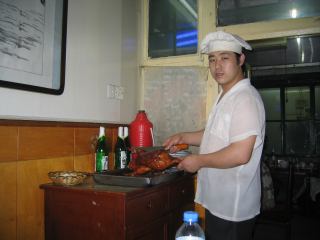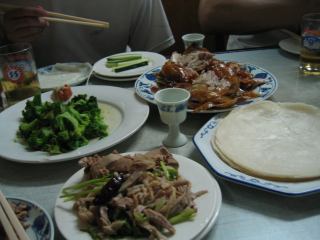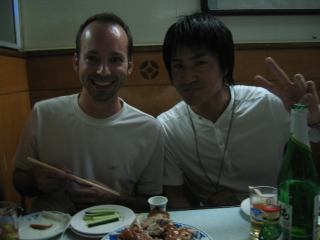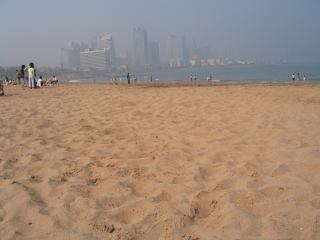Of particular importance during our visit to Beijing was the opportunity to try Beijing duck. Being the milquetoasts that we are, this turned out to be more of an adventure than we anticipated.
First, there was the question of how we were going to make a reservation. Our guide book (without which we would have been hard pressed to function well) suggested a restaurant but made it clear that the staff insisted upon a reservation. Had they not used the word ‘insisted’, we might not have bothered but, in the end, we decided to just call and see if we could bludgeon our way through the language in order to book a spot. Marc lost the rock-paper-scissors and so he made the call. “We may or may not have a table for two at seven.”
Now the second challenge: find the restaurant. Our obstacles were the following: different spellings of the name of the restaurant depending on which map we consulted, an inability to pronounce the name of the restaurant properly, an address within a maze of hutong (small alleyways) which didn’t appear on any map we had, and a city in a frenzy of destruction and reconstruction of great areas of itself in anticipation of the 2008 Olympics. We had tried to find a bar the day before and were completely unsuccessful owing to the fact that not only had the bar changed its name and moved, the building it was in, and almost the whole street it was on, was in the process of being torn down. We gave ourselves a 30-minute window to this restaurant that looked to be approximately 5 blocks away. 28 minutes after setting out, Marc returned breathless to the spot I had been waiting while he scouted out the area for the restaurant. It had been an unsuccessful mission. Also, after 20 minutes of waiting , I started worrying that he had fallen into an open excavation and that, while standing there alone on the street corner in my only nice outfit, people were probably beginning to think I was a lady of the night.
As a last ditch effort, we approached a rickshaw driver and pointed to the name of the restaurant written in Chinese characters. He was happy to offer to take us there for what amounted to quite an inflated price. We in no position to bargain very much and so settled on a price quickly and jumped into the back of his converted motorcycle-rickshaw. A few weaving alleyways later, he stopped to ask for directions and we exchanged a glance that asked “should we turn back now or let ourselves become even more lost than we ever have before?” Just then, Marc spotted a sign for the place “Liqun Roast Duck Restaurant” and we hopped out in front of a place that truly lives up to the description of being a hole in the wall. Though these often prove to be where the best food is, so I was actually a little encouraged, if extremely over-dressed.
We walked inside, past the open, wood-burning stove, into a very crowded restaurant. We managed to charade that we had called for a reservation. A woman nodded and led us past a couple of other waiting fellows to our table in the back. Seconds later, the two fellows that were waiting at the front joined us at our table for four which, we guessed, meant that we were sharing. Not to worry, we ordered two of the ‘house specialty’ which looked to be roast duck with an assortment of appetizers (?) and beer. As the plated began to arrive, we learned that our neighbours had ordered the same thing and we found out that they were Japanese. A table of tourists!
And now the next challenge: figure out what we’re about to eat and how to eat it. We got six plates immediately: a plate of small, thin crepes, some broccoli, spears of cucumber, a dish with brown sauce and slivered scallions, a plate of ??, and something that looked like duck foie gras. We tasted each and, indeed, all were as we thought, including dish xyz, which was made up of a vegetable – more scallion? – and a meat – unidentifiable, slightly chewy, but not unpleasant. Normally, an unidentifiable meat would seem a bit disconcerting but I’ve lost track of the number of times we’ve been served something which we are completely unable to identify beyond being a part of either the plant or animal kingdom and we just have to dive right in. Most often, we eat the whole plate of miscellany without ever having been able to identify what it was, so we didn’t have much concern about tucking into this meal. However, at this point, I broke the number one rule of eating miscellany in China: don’t examine it. After a few bites, I had a closer look and it came to me that this was probably a plate of duck tongues. And then I was only able to to manage a few more bites before imaging the quacks that these tongues had once made and I pushed the dish aside. I didn’t feel too badly about it as our Japanese table mates hadn’t even touched their foie gras.
After some time, our neighbours’ roast duck arrived. It came whole, with the head attached, and we all took pictures before it was carved (which came as a relief as I was a little worried that we’d be presented with the whole thing and left to fend for ourselves armed only with wooden chopsticks and a sharpened bottle cap).

It was served on an enormous plate and there was enough lovely carved meat and crispy, fatty skin to have fed all four of us. They started in while our duck arrived for its photo session. It turns our that we were pretty lucky to have been sitting with these two as one fellow was living in Beijing and showed us the proper way to eat it: fill a thin crepe with duck and a little of each of the plates of what we had thought were appetizers, roll it up and dip into the brown sauce. With encouragement, further instruction and many napkins, we were able to eat our traditional Beijing Roast Duck and it was delicious, further strengthening the theory that some of the best food is served in the seediest joints.

Now that we had become friends, our table mates asked for a couple of extra glasses and offered us a shot of the beiju they were drinking. I had read about this drink, a traditional rice wine with over 50% alcohol content. Of course, we accepted. And again, and again- pause to order a second bottle – and again. It made the duck taste even better.

After all that adventure, and all that rice wine and beer, we figured we could find our way back through the maze to the hostel. Fortunately, our dumb luck led us straight there, where we could recommend this wonderful restaurant to other travelers.
 Our final destination in China is Qingdao, also pronounced “ching-dow.” Qingdao is known for it’s six beaches. The senior party officials have summer homes here. Many Koreans take the direct ferry from Incheon, which we will board for Korea. We came to lay in the sun for a few days before leaving China, but it’s been foggy, though the sun managed to burn a hole through the haze to color my legs and back an uncomfortable shade of pink. Qingdao was a German colony until World War II and German archiecture influenced many of the buildings in the city. We have theorized that this influence may have extended to the notion of making beer: did I mention that Qingdao is also famous for making Tsingtao?
Our final destination in China is Qingdao, also pronounced “ching-dow.” Qingdao is known for it’s six beaches. The senior party officials have summer homes here. Many Koreans take the direct ferry from Incheon, which we will board for Korea. We came to lay in the sun for a few days before leaving China, but it’s been foggy, though the sun managed to burn a hole through the haze to color my legs and back an uncomfortable shade of pink. Qingdao was a German colony until World War II and German archiecture influenced many of the buildings in the city. We have theorized that this influence may have extended to the notion of making beer: did I mention that Qingdao is also famous for making Tsingtao?